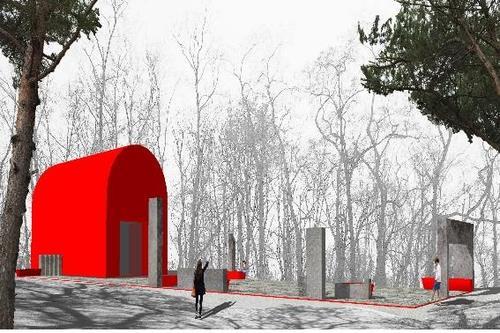New park on Mount Nam to retrace history of colonialism, military dictatorship
By YonhapPublished : Feb. 3, 2021 - 12:01

Seoul's landmark Mount Nam will have a new park by May, offering plenty of greenery and memorials to the country's turbulent history under military dictatorships and Japanese colonial rule, the city government said Wednesday.
The park, which was built on the former martial arts training grounds of soldiers during the Joseon Dynasty (1392-1910), is made up of an upper area consisting of a 13,036-square-meter forest and a lower underground area dedicated to memorializing the past, according to the city government.
The location was once the site of a building used by the Korean Central Intelligence Agency, the predecessor of the National Intelligence Service, where authorities conducted interrogations using torture during the military dictatorships of the 1960s and 70s.
The forest, which opened on Jan. 1, boasts more than 60,000 trees and an observation post with views of the nearby Myeongdong district, a tourism hot spot.
At the entrance to the forest stands a pine tree bearing the name, "That pine tree atop Mount Nam," a reference to a line in the Korean national anthem.
"We have transformed the space into a place where citizens can rest while feeling and remembering the site of our painful past," acting Seoul Mayor Seo Jeong-hyup said.
In addition to an 8,485-square-meter parking lot, the park's lower area consists of a memorial hall modeling an interrogation room used by the KCIA, and the foundations of the official residence of the Japanese governor-general of Korea during Tokyo's 1910-45 colonial rule of the peninsula.
Still to be completed is a memorial hall dedicated to Lee Hoi-young, a man who gave up all of his wealth to fight for independence from Japanese colonial rule. The museum is scheduled to open in May.
The project began in 2015 with the aim of restoring the site's historical nature and the mountain's original appearance. Construction work ended in December. (Yonhap)
The park, which was built on the former martial arts training grounds of soldiers during the Joseon Dynasty (1392-1910), is made up of an upper area consisting of a 13,036-square-meter forest and a lower underground area dedicated to memorializing the past, according to the city government.
The location was once the site of a building used by the Korean Central Intelligence Agency, the predecessor of the National Intelligence Service, where authorities conducted interrogations using torture during the military dictatorships of the 1960s and 70s.
The forest, which opened on Jan. 1, boasts more than 60,000 trees and an observation post with views of the nearby Myeongdong district, a tourism hot spot.
At the entrance to the forest stands a pine tree bearing the name, "That pine tree atop Mount Nam," a reference to a line in the Korean national anthem.
"We have transformed the space into a place where citizens can rest while feeling and remembering the site of our painful past," acting Seoul Mayor Seo Jeong-hyup said.
In addition to an 8,485-square-meter parking lot, the park's lower area consists of a memorial hall modeling an interrogation room used by the KCIA, and the foundations of the official residence of the Japanese governor-general of Korea during Tokyo's 1910-45 colonial rule of the peninsula.
Still to be completed is a memorial hall dedicated to Lee Hoi-young, a man who gave up all of his wealth to fight for independence from Japanese colonial rule. The museum is scheduled to open in May.
The project began in 2015 with the aim of restoring the site's historical nature and the mountain's original appearance. Construction work ended in December. (Yonhap)




![[Herald Interview] 'Amid aging population, Korea to invite more young professionals from overseas'](http://res.heraldm.com/phpwas/restmb_idxmake.php?idx=644&simg=/content/image/2024/04/24/20240424050844_0.jpg&u=20240424200058)












![[KH Explains] Korean shipbuilding stocks rally: Real growth or bubble?](http://res.heraldm.com/phpwas/restmb_idxmake.php?idx=652&simg=/content/image/2024/04/25/20240425050656_0.jpg&u=)

